|
|
|
Sort Order |
|
|
|
Items / Page
|
|
|
|
|
|
|
| Srl | Item |
| 1 |
ID:
133399
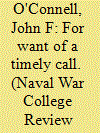

|
|
|
|
|
| Publication |
2013.
|
| Summary/Abstract |
This essay describes an incident of some thirty years ago that involved relations between the United States and Japan. It stemmed from a chance encounter at sea in international waters, between a U.S. warship and a Japanese commercial vessel. If there are lessons to be learned from this event, it is that small things matter; they are like grains of sand that gum up the machinery of smooth international relations. At the time, I was defense and naval attaché to the American embassy at Tokyo, where I became involved in the situation after the fact. To my knowledge, this is how the story unfolded.
|
|
|
|
|
|
|
|
|
|
|
|
|
|
|
|
| 2 |
ID:
133396


|
|
|
|
|
| Publication |
2013.
|
| Summary/Abstract |
In this article, the author examines the relationship between economic globalization and international security. The author discusses the increasingly interconnected nature of national economies in the 21st century and argues against dominant thinking that states that the large majority of global trade is based in water shipping. The importance of information flow and systems to the success of trade and transportation is explained. It is argued that the nature of the world economy, largely characterized by bilateral trade agreements, can lead to disruptions in supply chains
|
|
|
|
|
|
|
|
|
|
|
|
|
|
|
|
| 3 |
ID:
133400
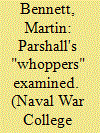

|
|
|
|
|
| Publication |
2013.
|
| Summary/Abstract |
This was written in response to an article by Jon Parshall that appeared in the Spring 2010 Naval War College Review.1 When I first came across Parshall's article I was interested and even intrigued, but the more I read, the more apparent it became that his work was not sound. One element, I believe, that may have colored what otherwise might have been an objective analysis was Parshall's clearly stated goal to "bury Fuchida." Generally, a biased, set conclusion is not a good starting point for a historical analysis. Good research begins with questions and ends with conclusions, when facts permit. Parshall attempts to make the facts fit his conclusions, and when he cannot, he uses conjecture and assumptions to try to bridge the gap. Throughout his article, Parshall employs a wide variety of euphemisms accusing Fuchida of "lies." One would expect a less snarky, cynical analysis from a historian.
|
|
|
|
|
|
|
|
|
|
|
|
|
|
|
|
| 4 |
ID:
133394
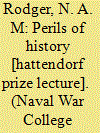

|
|
|
|
|
| Publication |
2013.
|
| Summary/Abstract |
The British naval historian N.A.M. Rodger, in the Hattendorf Prize Lecture last October at the Naval War College, emphasized both the importance of studying history and the perils of misusing the past to analyze current international relations. Historians who use the past to predict the future, he said, are foolish.
"History," he explained, "never repeats itself exactly; historical parallels are never really parallel, and the 'lessons of history' are at best general warnings, not specific instructions.
|
|
|
|
|
|
|
|
|
|
|
|
|
|
|
|
| 5 |
ID:
133397
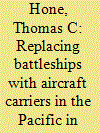

|
|
|
|
|
| Publication |
2013.
|
| Summary/Abstract |
The article discusses changes in U.S. Navy tactics and operations in the Pacific theater of World War II, which were characterized by the increased use of aircraft carriers. The author discusses the implementation of naval aviation programs in the organization prior to the onset of World War II, and argues that carriers were not used as outright replacements for battleships.
|
|
|
|
|
|
|
|
|
|
|
|
|
|
|
|
| 6 |
ID:
133398
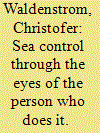

|
|
|
|
|
| Publication |
2013.
|
| Summary/Abstract |
This article suggests a new perspective on the old problem of protecting ships at sea, for two reasons. First, although screen tactics and other defensive measures have been developed and used for many years, this new perspective will be useful in addressing two developments since the late nineteenth century: attackers are no longer just other ships but also aircraft, submarines, and, recently, missiles with very long ranges launched from the land; also, torpedo boats, coastal submarines, and mines have complicated operations in congested and archipelagic waters. The second reason for a new approach is that in order to support commanders in the problems of sea control we need to study the issues they encounter while solving them. This requires a description of each task that commanders have to do; without such a description it becomes difficult to determine which actions lead to increased control and which to loss of control, which in turn makes it harder to identify whether commanders are running into trouble and if so, why. The new analytical method introduced here represents an attempt at such a description. As such, it may enrich and extend traditional thinking about sea control and how to achieve it, especially in littoral waters.
|
|
|
|
|
|
|
|
|
|
|
|
|
|
|
|
| 7 |
ID:
133395
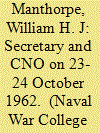

|
|
|
|
|
| Publication |
2013.
|
| Summary/Abstract |
The Cuban missile crisis was a defining moment in the career of the Chief of Naval Operations (CNO) at the time, Admiral George W. Anderson, Jr. His leadership of the Navy during the crisis has become the most prominent role accorded to him in history. Yet his relationship during the crisis with the Secretary of Defense, Robert S. McNamara, has been cited as the factor that brought to a premature end his tour as CNO and his naval career. Among the events that affected the admiral's relationship with the secretary during the crisis were those that took place on 23-24 October 1962 in CNO's Intelligence Plot (IP)-part
of the Office of Naval Intelligence (ONI), located adjacent to but separate from CNO's operational Flag Plot and charged with providing all-source intelligence to the CNO, cleared Navy staff, and others.
|
|
|
|
|
|
|
|
|
|
|
|
|
|
|
|
|
|
|
|
|